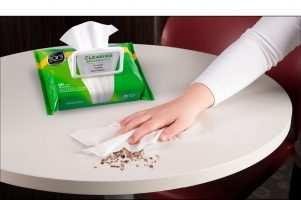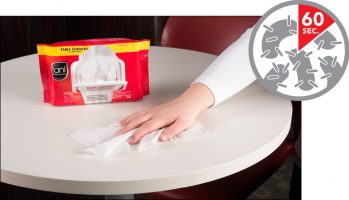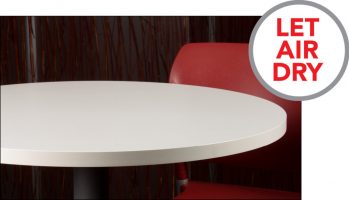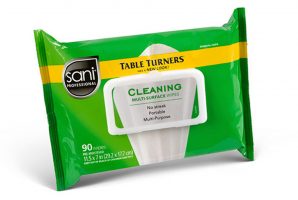Cleaning, Sanitizing & Disinfecting
What's the Difference?
CLEANING – Cleaning is the removal of visible soil and food debris from surfaces.1 Cleaning is a prerequisite for effective sanitization. 1
SANITIZING – Sanitizing reduces the presence of any bacteria, viruses and fungi on a previously cleaned surface to safe levels. 1
DISINFECTING – Disinfecting is the elimination of pathogens and disease-causing microorganisms.1
Clean First for Food Safety and Guest Satisfaction
A foodborne illness outbreak can be a catastrophic blow to any foodservice operation.
Fortunately, by following proper surface cleaning/sanitizing protocols, operators can avoid cross contamination that can lead to outbreaks and Food Code violations.
According the U.S. FDA Food Code, it is necessary to clean a surface prior to sanitizing or disinfecting. Cleaning is the removal of all organic matter – including food debris, liquids, and food residues (such as oil and grease) – from a surface. Leaving behind any type of contaminant not only allows for bacteria growth, but also prevents sanitizers from coming in direct contact with the surface. Thus, only when a surface is first properly cleaned can it be effectively sanitized.
After the surface has been cleaned, a sanitizer should be applied. Sanitizing reduces the presence of potentially harmful microorganisms, rendering the previously cleaned surface safe for contact with food. The surface must remain wet according to the time indicated on the manufacturer’s label for sanitization to occur.
Additionally, cleanliness consistently ranks near the top of factors that most affect guest experience. In fact, 43% of people wouldn’t return to a dirty restaurant unless it was “absolutely necessary”3 and 21% of all negative restaurant reviews on sites like Yelp! and OpenTable specifically cited poor restaurant cleanliness.4
If you’re dropping the ball on cleaning protocols, the effect can be catastrophic. Surveys show that 85% of restaurant patrons would not return to businesses with negative online reviews citing lack of cleanliness.5
Easy As 1, 2, 3:


2. Sanitize cleaned surface.
(If using Sani Professional No-Rinse Sanitizing Multi-Surface Wipes, allow treated area to remain wet for one [1] minute.)

Sani Professional Cleaning Multi-Surface Wipes make cleaning quick and easy.
Use prior to sanitizing/disinfecting or anytime and anywhere for a quick cleanup.
SOURCES:
- https://www.webstaurantstore.com/article/16/health-inspection-checklist.html
- https://www.ncbi.nlm.nih.gov/pmc/articles/PMC4591533/
- https://www.qsrmagazine.com/food-safety/keep-it-clean
- https://www.fsrmagazine.com/food-safety/why-guests-arent-coming-back-your-restaurant
- https://www.businesswire.com/news/home/20150609005439/en/Poll-Reveals-85-percent-Americans-Patronize-Business#.VX3Dcfmqqkr


